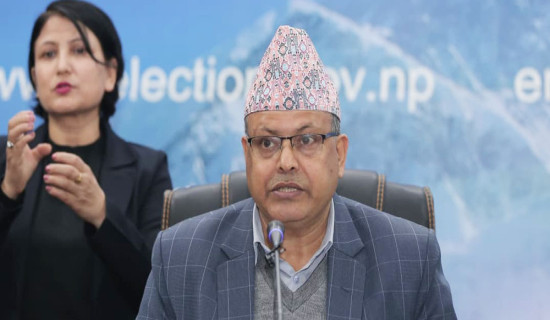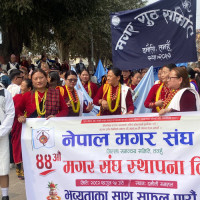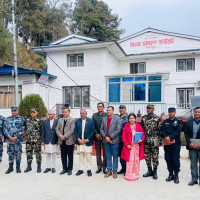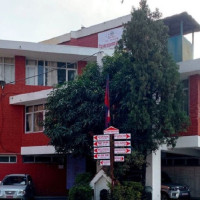- Saturday, 28 February 2026
Strengthening Electoral Integrity
Democracy Resource Centre Nepal (DRCN), a non-state civic initiative, has been carrying out studies and investigations into the contemporary politics and democratic institutions of Nepal for some years now. The Centre’s research primers and updates, especially on the issues related to performance of federal entities - provincial and local governments, electoral politics and integrity in Nepal, inform readers and researchers with facts, their analysis and interpretations. The Centre has shared an introductory primer recently on the Integrated Election Bill, both in Nepali and English, summarising its key provisions.
The primer contains a summary of important provisions enshrined in the Bill finalised by the Election Commission of Nepal to address the interests and imperatives of free and fair democratic polls in Nepal. Electoral laws and regulations form the vital basis of free, fair, and credible elections, and these need to be updated time and again. As with many other countries, Nepal is in need of periodically amending and revising its electoral laws to enhance and strengthen the integrity of election management. Accordingly, the Election Commission (EC) prepared a draft of an integrated election bill after several rounds of discussion and deliberation with stakeholders during the previous year. This draft consolidates seven election-related acts along with provisions from the Election Commission Act.
Transformative provisions
According to the EC, the draft also includes directives from the Supreme Court, relevant international best practices, past experiences, and recommendations from diverse actors and stakeholders. The draft bill indeed introduces some transformative provisions to make the election process more effective, reliable and streamlined. It proposes provisions related to voter roll management, candidate eligibility criteria, enforcement of a stricter code of conduct, transparency in election expenditures, voting arrangements for Nepali citizens living abroad, and mechanisms to ensure proportional representation. The Bill is claimed to be subservient to the spirit of the Constitution’s fundamental rights, which emphasize, among others, citizen participation, representation, justice and social inclusion.
Going by the contents of the reform proposals contained in the Bill, it can be said that the draft Bill represents a significant step towards strengthening the country’s electoral integrity system. It aims to enhance and consolidate election management by promoting transparency, accountability, and inclusiveness. Key issues such as the voting rights of Nepali citizens living abroad, temporary voter registration, advance voting, the ‘no vote’ option, term limits, and improvements in the candidate selection process have the potential to make the democratic process more systematic. These issues have been more or less addressed in the Bill
The EC has forwarded the draft of the bill to the Ministry of Home Affairs for presentation before the federal parliament for discussion and enactment almost a year ago. However, the Ministry has not reportedly initiated any steps to seek the nod of the cabinet to introduce the draft bill in the federal parliament. The outcome of the initiative taken on behalf of the EC risks failing in case the Home Ministry avoids taking cognizance of the matter and procrastinates to fulfil its responsibility. Despite some caveats, if the Bill is enacted by the parliament, the law could address some of the underlying critical issues about elections and enhance transparency, accountability, and integrity in Nepal’s electoral system. Certain issues need to be further discussed and addressed to implement the provisions in the Bill, which can be done while formulating the bylaws, directives and implementing procedures.
There has been a long-standing demand to grant and ensure voting rights for Nepali citizens living abroad. The proposed Bill includes a provision for collecting details of Nepalis residing overseas as part of electoral roll preparation. It states that diplomatic missions and other authorized bodies may be mobilised to collect information on Nepali citizens eligible to vote under the law. Given the persistent demand for such arrangements and the directives issued by the Supreme Court, this inclusion is appreciable. However, certain practical challenges may pose difficulties in implementing the provision in the draft.
Alternative voting method
Nepalis are spread across more than a hundred countries, while Nepal has resident diplomatic missions in only a few of them. Even in countries where Nepali missions exist, it is not feasible for all eligible voters to physically visit these offices and wait in line to cast their votes. This challenge is even greater in India, where millions of Nepalis reside, and in large, geographically dispersed countries like the United States. Similarly, a large number of Nepali migrant workers live in Gulf countries, Malaysia, South Korea, and other destinations where gathering large numbers of migrant workers in one place may not be permitted by host governments. Hence, without an alternative voting method using modern technology, the provision for overseas voting may remain largely symbolic and difficult to implement.
Although it is important to ensure the right to vote for Nepalis living abroad, the priority should be given to make voting arrangements for citizens who have migrated in search of employment and other opportunities within Nepal itself, as stated in the primer on the draft Bill shared by the DRCN even if certain provisions may be challenging to implement in practice. Therefore, comprehensive discussions are required on topics like managing overseas voting, ensuring voting rights for internal migrant workers, using technology to prevent double voting, and addressing the financial and administrative implications of re-elections. Without a practical and accessible system developed both for Nepalis living abroad and for internal migrants, the overall implementation of these provisions to guarantee the right to vote will remain potentially ineffective.
(The author is presently associated with Policy Research Institute (PRI) as a senior research fellow. rijalmukti@gmail.com)









-original-thumb.jpg)







